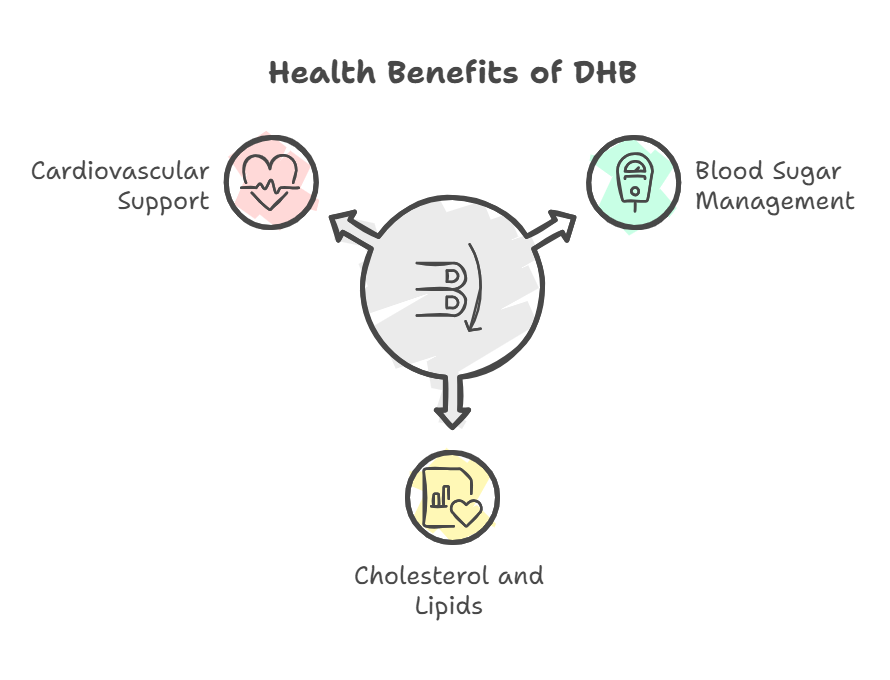You might have heard talk in wellness groups about a supplement. It claims to help with blood sugar control, cholesterol levels, and other issues. It sounds almost too good to be true, but could it actually live up to the hype?
Enter Dihydro Berberine (DHB), a derivative of the well-known compound berberine. Berberine has become popular for its many health benefits. It supports metabolic health, boosts insulin sensitivity, and promotes heart wellness.
“Best dihydro berberine supplement offers a promising alternative to traditional berberine, with improved bioavailability and fewer side effects.”
Dr. Sarah Roberts
Dihydro berberine supplement claims to provide these benefits. It has better bioavailability and is easier on the digestive system. This makes it a more attractive choice for many people.
This overview of dihydro berberine explains how it works. It also includes recent research and helps you decide if it’s the right supplement for you. This guide will help you improve your metabolic health. You’ll also learn about this powerful compound.
What is Dihydro Berberine (DHB)?
Dihydro berberine supplement isn’t a lab-created concoction.
Berberine has a long history of use in traditional medicine for gut health. However, its absorption has always been a challenge.
DHB addresses this absorption issue. Researchers are looking into dihydroberberine benefits for blood sugar control. They also study how it helps manage cholesterol. Plus, it may support heart health. It may also improve lipid metabolism and impact the gut microbiota.
Dihydro Berberine vs. Berberine: A Tale of Two Compounds
Think of berberine as the original, with DHB as its refined cousin. A key difference lies in absorption. Berberine has poor bioavailability; your body doesn’t absorb much of it.
Studies1 suggest berberine’s bioavailability is less than 1%. This poor absorption limits its effects and can require higher doses, leading to digestive upset.
Dihydro berberine supplement’s structure allows for better absorption. A 2021 study quantified DHB’s improved absorption compared to berberine. When you ingest berberine, intestinal bacteria convert some of it into DHB.
Since DHB enters your cells to exert health effects, this conversion process is crucial. Much of the initial berberine may have unwanted impacts on the gastrointestinal tract, causing discomfort for some individuals.
However, dihydro berberine quickly converts back to berberine inside the cell, even when delivered transdermally. This property makes DHB a more efficient and gentler option for those who may be sensitive to traditional berberine supplements.
For more information on optimizing your metabolism and addressing symptoms of slow metabolism, check out our guide on slow metabolism symptoms, where we explore how supplements like DHB can help support metabolic health.
Dihydro berberine and AMPK Activation
How does dihydro berberine work? It targets AMPK, a metabolic master switch. When activated, AMPK promotes glucose uptake by cells and enhances fatty acid oxidation. This influences blood sugar and lipid levels.
Dihydro berberine supplement converts quickly to berberine in cells, activating AMPK. Professor Nigel Turner’s 2008 research highlighted DHB’s ability to boost insulin sensitivity through AMPK activation2.
DHB may be beneficial for metabolic health and AMPK activity. Regarding insulin signaling, absorbed DHB can enhance insulin’s effect and potentially lower the need for high blood glucose. A 2018 study found a synergistic effect when dihydro berberine supplement and metformin are administered together3.
DHB also promotes the movement of glucose transporters to cell membranes. These transporters let glucose enter cells more easily, lowering blood sugar levels. AMPK and its effects are essential topics for people managing their blood sugar.
If you’re looking for a natural way to support healthy blood sugar levels, I came across something recently that really caught my attention. It’s a supplement that contains 100mg of Dihydroberberine, which has shown great potential in helping manage blood sugar and supporting metabolic health.
I’ve read some positive feedback from people who have tried it, and it could be a helpful addition if you’re looking for extra support. You can check Dihydroberberine Supplement out here.
Research, such as Moon et al. 2021, confirms this mechanism when taking DHB. It quickly converts back to berberine once in the blood.
Remember that studies so far have had limited time scales and small participant groups. Longer trials with individuals with health conditions are needed. Note also that many studies have used rodent subjects which cannot completely represent human biology.
Dihydroberberine Benefits
Blood Sugar Management
Several studies suggest dihydroberberine supplement may support blood sugar management. By activating AMPK, DHB may improve insulin sensitivity and promote glucose uptake. This could help maintain healthy blood sugar levels already within a normal range.
Cholesterol and Lipid Metabolism
Dihydroberberine benefits extend to cholesterol and lipids. A 2022 study in Nature highlighted DHB’s positive impact on cholesterol levels over 90 days. This suggests DHB may play a role in supporting healthy cholesterol4.
Cardiovascular Support
Emerging research suggests dihydroberberine supplement may protect cardiovascular health. Its effect on lowering triglycerides and cholesterol may be important for heart and artery health, as mentioned in Wu et al., 2024.
Berberine’s role in reducing complications after open-heart surgery in certain patients 5 is also notable. Since DHB rapidly converts to berberine in the blood (2018 study), the DHB-berberine relationship may indicate potential cardiovascular benefits.
Talk to a healthcare professional about DHB. They can help you see if it fits your health needs and concerns. They offer personalized advice for men’s health, women’s health, and heart health.

Consider how DHB could impact your heart health before adding this natural plant product to your routine. If needed, they can also perform a blood test.
Addressing Common Concerns and Cautions with Dihydro berberine
While dihydro berberine supplement is promising, some people experience gastrointestinal issues at higher doses. If you’re pregnant, breastfeeding, or have health issues, talk to your doctor first. This applies to DHB and any supplement. This helps ensure it’s safe and right for you.
Proceed with caution when changing supplements. Berberine, especially as DHB, is a strong compound. It supports metabolic health, improves insulin sensitivity, and regulates blood sugar levels.
Dihydro berberine supplement can help improve lipid levels, lower inflammation, and boost heart health. However, its effects can differ based on a person’s health and lifestyle. Adjusting your dose based on how your body responds can boost dihydroberberine benefits and reduce side effects.
To get the best results, add dihydro berberine to a healthy lifestyle. This means eating a nutrient-rich diet, exercising regularly, and managing stress. If you’re not sure if DHB is for you, ask a qualified healthcare professional. Get their advice before adding it to your supplements.
Frequently Askd Questions
What does dihydro berberine do?
Dihydro berberine supplement primarily activates AMPK, a crucial enzyme for regulating metabolism. It works well with metformin to enhance glucose balance. This is especially true for those using metformin, but only with their doctor’s okay.
What is the difference between dihydro berberine and berberine hcl?
Dihydro berberine is a reduced form of dihydroberberine supplement with enhanced bioavailability. Berberine HCL is berberine hydrochloride, which enhances berberine’s solubility. Dihydro berberine is absorbed better. This may lead to fewer digestive side effects when taken at normal doses.
Who should avoid berberine?
Pregnant women, breastfeeding moms, newborns, and people with liver issues or diabetes on medication need to be careful. They must talk to their healthcare provider first. These patient populations are particularly sensitive to health changes. Any DHB use for these groups should follow strict instructions from healthcare authorities.
Does berberine reduce belly fat?
Some studies indicate dihydroberberine supplement might support weight management by improving metabolic function. However, long-term research specifically targeting belly fat reduction is insufficient.
Conclusion
Dihydro berberine has better bioavailability and is easier to digest. This makes it a better choice than regular berberine. It activates AMPK. This is a key metabolic regulator.
It helps with energy balance, glucose metabolism, and fat use. DHB offers several benefits. It can improve insulin sensitivity, help with weight management, and support heart health.
It can help control blood sugar and lower inflammation. This makes it a strong supplement for your overall health.
Looking to optimize your health naturally? Talk to our expert team for personalized guidance. Check out our health and wellness resources. You’ll find detailed insights on dihydro berberine and other new supplements.
Small Step, Big Impact
If you’re considering trying dihydro berberine to support your metabolic health, start by consulting with your healthcare provider to determine the right dosage. Remember, consistency is key to seeing results.
Listen to this article
This is an AI generated Podcast version of the article.
- https://doi.org/10.1016/j.fitote.2016.02.001[↩]
- https://www.researchgate.net/publication/5565619_Berberine_and_Its_More_Biologically_Available_Derivative_Dihydroberberine_Inhibit_Mitochondrial_Respiratory_Complex_I_A_Mechanism_for_the_Action_of_Berberine_to_Activate_AMP-Activated_Protein_Kinase_a[↩]
- https://gethealthspan.com/science/article/dihydroberberine-metabolic-regulation-cellular-senescence-reduction?srsltid=AfmBOoo_rjO_gATnSRPmYF_QFLrFb-4a9fSCuAh72QUMwHj99wBsOfK8[↩]
- https://www.prevention.com/health/memory/a62967194/changes-in-cholesterol-linked-to-higher-dementia-risk-study/[↩]
- https://pubmed.ncbi.nlm.nih.gov/34444711/[↩]



